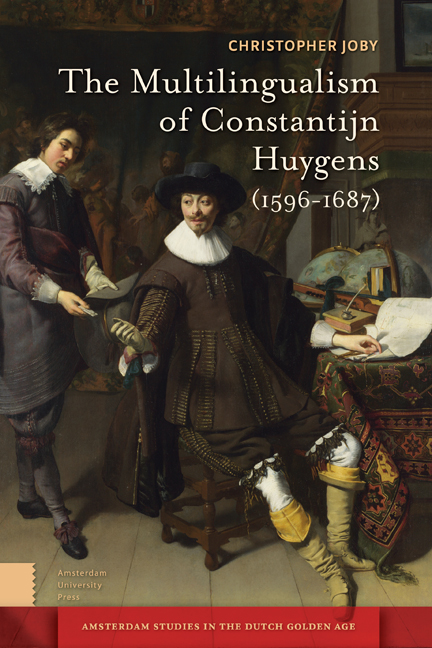Book contents
- Frontmatter
- Dedication
- Contents
- List of Illustrations
- List of Abbreviations
- Acknowledgements
- Prologue
- 1 Multilingualism: An Introduction
- 2 Huygens’s Language Acquisition
- 3 The ‘Multidimensionality’ of Huygens’s Multilingualism
- 4 Huygens’s Multilingualism in Music, Science, and Architecture
- 5 Huygens and Translation
- 6 Code Switching in Huygens’s work
- 7 The Multilingualism of Huygens’s Children
- Epilogue
- Appendix
- Bibliography
- Index
1 - Multilingualism: An Introduction
Published online by Cambridge University Press: 16 February 2021
- Frontmatter
- Dedication
- Contents
- List of Illustrations
- List of Abbreviations
- Acknowledgements
- Prologue
- 1 Multilingualism: An Introduction
- 2 Huygens’s Language Acquisition
- 3 The ‘Multidimensionality’ of Huygens’s Multilingualism
- 4 Huygens’s Multilingualism in Music, Science, and Architecture
- 5 Huygens and Translation
- 6 Code Switching in Huygens’s work
- 7 The Multilingualism of Huygens’s Children
- Epilogue
- Appendix
- Bibliography
- Index
Summary
In this introductory chapter I want to set the scene for the rest of this book. The principal subject of this volume is the multilingualism of Constantijn Huygens, so, in order to provide the necessary background for this study, consideration will be given to what multilingualism is. I shall begin by exploring how the term can be applied to an individual, such as Huygens, and then discuss how it can be applied to the nation or society. In regard to the latter, an account will be provided of various aspects of multilingualism in Huygens's native country, the United Provinces, in the early modern period. He operated in a number of social domains, and so consideration will be given to which languages were used in each of these contexts. I shall also introduce other multilinguals in the United Provinces at this time, with some of whom Huygens was in close contact, in order to give a sense of the particularity or otherwise of his own multilingualism. Furthermore, a brief account will be given of the multilingual landscape of another country with which Huygens had dealings, England, in order to place his own multilingualism and that of the United Provinces in a broader context. In short, this chapter provides the framework within which to place the specific material concerning the multilingualism of Constantijn Huygens, which will be presented in the remainder of this book.
What Is Multilingualism?
I make a start by asking what multilingualism is. In his response to this question, Michael Clyne begins by stating that the term ‘multilingualism’ can refer either to the language use of an individual or to that of an entire nation or society. I take this two-fold definition and consider first how the term is applied to an individual, such as Constantijn Huygens, and thereafter how it applies to a nation, primarily the United Provinces but also its maritime neighbour, England.
Individual Multilingualism
In relation to how the term ‘multilingualism’ is applied to the individual, Clyne notes that ‘normative’ definitions, which attempt to prescribe closely what is and what is not multilingualism, have proved unrealistic. This has led to more general definitions, such as ‘the use of or competence in more than one language’ (Clyne 1997: 301).
- Type
- Chapter
- Information
- The Multilingualism of Constantijn Huygens (1596–1687) , pp. 19 - 48Publisher: Amsterdam University PressPrint publication year: 2014



